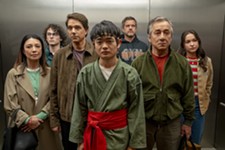
After Yang
2022, PG, 96 min. Directed by Kogonada. Starring Colin Farrell, Jodie Turner-Smith, Malea Emma Tjandrawidjaja, Justin H. Min.
REVIEWED By Richard Whittaker, Fri., March 4, 2022
In After Yang, the first image is of a multiracial family, with a white father, Black mother, and two Chinese children. It’s a simple, happy moment before the family has to navigate an unexpected and quiet tragedy that hits one of the kids, and ripples through them all.
Director/co-writer Kogonada took a very different but equally thoughtful look at the Asian American experience in 2017’s indie essential Columbus, and that’s an undeniable element of After Yang, as is Columbus’ tender examination of how we grieve without real closure. In his feature debut, Kogonada left Jin Lee (John Cho) waiting for his comatose father to finally die. After Yang, an adaptation of Alexander Weinstein’s short story “Saying Goodbye to Yang,” also picks up that implicit theme of sifting through emotional ashes. However, the question is whether Yang (Min) is really dead – or rather, can he be classified as having been alive.
He’s a techno-sapien, a biological robot purchased by Jake (Farrell at his understated best) and his wife, Kyra (Turner-Smith), to give their adopted daughter, Mika (Tjandrawidjaja), some sense of connection to her birthplace in China. One day this kindly big brother just stops working, and Jake has to work out what to do with this member of their family who is now out of warranty.
The touchstone for post-human science fiction undoubtedly remains Blade Runner, and Mandy cinematographer Benjamin Loeb undoubtedly gives subtle homage to Jordan Cronenweth’s color palette, even while this is at every level quieter and more pastoral than Ridley Scott’s polluted techno-dystopia. However, that film was centered around a simple dichotomy, the line between human and machine. After Yang is subtler in its exploration of connections and identity, and also utterly without condemnation. As Jake hauls Yang’s carcass/components between engineers, he’s trying to work out what this entity meant to him, and to his family.
Kogonada doesn’t simply use the technological background of Yang as a metaphor for the migrant experience. Instead, they are complementary elements in a discussion about connection and identity that suits the nebulous near-future setting. The answers he provides – or rather, implies – are suitably elusive. In part, that’s because he poses questions to which we do not need answers quite yet, such as the legal standing of synthetic humans or anti-clone bias, but about which we should start thinking before too long. Others are too emotionally convoluted for logical answers, like Jake’s well-intentioned Orientalism and his paternal desire to connect Mika to a heritage from which she seems happily detached. But all the questions have an undeniable universality, looking sympathetically to the emotional contradictions within us all. The more Jake tries to logicalize his loss, the more he feels it. After Yang will resonate with anyone who has absorbed such emptiness into themselves, and found some comfort there.
A note to readers: Bold and uncensored, The Austin Chronicle has been Austin’s independent news source for over 40 years, expressing the community’s political and environmental concerns and supporting its active cultural scene. Now more than ever, we need your support to continue supplying Austin with independent, free press. If real news is important to you, please consider making a donation of $5, $10 or whatever you can afford, to help keep our journalism on stands.
Kahron Spearman, Aug. 25, 2017
May 31, 2025
After Yang, Kogonada, Colin Farrell, Jodie Turner-Smith, Malea Emma Tjandrawidjaja, Justin H. Min









